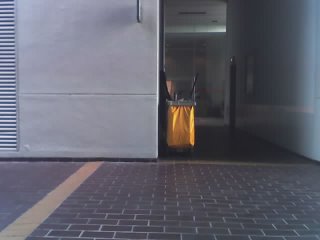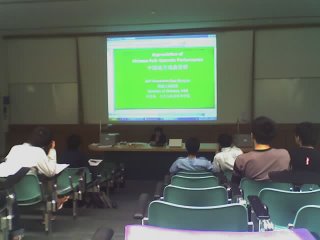The prints in blue are not written by Odiejon, i am not such goody student.
"Dear all,
I would like to share with you my experience when I was your age, once upon a time ...
Once upon a time, after JC I went on to study in NUS. I was ambitious and aimed to get 1st class honours! In a way I also wanted to make my parents happy as I was given a car for my own use (my 19th birthday present!!!) though the family was not a rich one. I practiced the following:
1. Lectures:
I read through the lecture notes after every lecture in detail, and wrote a summary (in point form) about the important concepts/formulae in my little books - I had one little book for each subject. Advantages of writing summary: it was easy to refer to when doing tutorials. I could remember better, internalize the concepts, relate the concepts, see things in a better picture, etc - a great help in doing revision.
Of course while reading the notes, there were many times that I could not understand certain things, so I would mark the doubts on the lecture notes and seek the lecturer for clarification. Mind you, I always went to 'disturb' the lecturers, especially those who could not explain well :p. I always tried to clear all doubts before the next lecture.
Where did I sit during lectures? I always took a front seat, so that I got a better view of the transparencies/black board (in those days, students had to copy lecture notes, tough, right?). In particular, I could see and hear the lecturer clearly, watched his expression ..., the IMPACT was stronger than sitting far behind, and it was this impact that gave better concentration and lasting impression, which led to better understanding and memory.
2. Tutorials:
I always tried to do the tutorial questions before going to tutorial. In that way, although there were questions that I could not do (very often), at least I was familiar with the problems and knew what the difficulties were. So during tutorial I would be able to understand the solutions better as well as to appreciate the ways of tackling the problems. After each tutorial, I would tidy up my solutions, put everything in order, in short, complete the tutorial, before keeping it in the subject file. Oh yes, I had a file for each subject. From time to time, I might attend 2 tutorial sessions on the same tutorial. Why? Because I was 100% KS :p, my tutor was not the lecturer and I felt that sometimes the lecturer could explain better and gave a neater solution. But, of course, nowadays the lecturer gives solutions to each tutor, so it is standardized across all groups, and there is no need for you to practise this!
sincerely, Dr Patricia
To be contd.
My experience (part 2)Exam preparation
When to start preparing for exam? On Day 1! You might recall that I was a typical (?) KS Singaporean, well, from the way that I handled lectures and tutorials, it is obvious that preparation for exam was continuously going on, only perhaps at a less intensive pace.
The most intensive part was carried out during recess. Recess: a time to work hard, not to relax. I would draw up a plan, not only that I list the subjects that I was going to revise, but also how much I was going to complete (e.g. how many chapters/pages/tutorials). Of course the plan had to be a feasible one, no point if it could only be achieved by Superman, right? I would follow the plan strictly, yes, never gave myself the excuse that I could push the incomplete portion to the next day. How many hours a day for revision? Approximately
24-7-3=14 hours (7-hour sleep, 3 hours for meals, bath, etc).
Not too bad, huh? Nowadays, many undergrads get less than 7 hours of sleep. I guess the remarkable point is: I was disciplined enough to carry out all these way ahead of exam. The key is: start to prepare early, the earlier the better.
How about during term time? Was there revision carried out also? Of course, but since there were new lecture notes and tutorials kept coming, the revision was done at a slower pace. I tried not to waste time, for eg, during the few min sitting in the LT waiting for the next lecture to begin, I would read the notes or my summaries.
A month before exam: The finale. Stop watching TV completely !!! Can you imagine that !!! Other than necessary daily routine, all time was devoted to revision. More on this later.
sincerely,
Dr Patricia
To be contd."
Acknowledgement: By Associate Professor Patricia J. Y. Wong on EdveNTUre.
Not everyone is disciplined enough to study for 14hrs daily during the 1 week recess. It is not v possible for me too. Every recess, I would spend about 2-3 days doing the Lab Report, and 1-2 days for trying out the tutorial questions. Note that I used the word 'trying', trying isn't equivalent to working out. Sometimes even after trying out for days, I still could not manage to get the answer. This is v frustrating and hair-tearing cos sitting at your desk for days yet arrive-at-no-answer is a complete waste of time! If I were to give up halfway, it looks like I had attempted less than half of the tutorial questions and all my time spent on trying seemed wasted. I keep thinking that I may get the answer real soon if I continue to try it out. Instead, more time is wasted lor.
I am not-so-ambitious, I wish to get a 2nd lower or 3rd class honours. judging from my gpa, I know where I stand. There is a possibility that I could end up in no honours (that would be a Pass or.. fail.). I had calculated that 2nd lower is abit beyond my reach unless I can score a few Ace every next semester. Plus the factor that there are too many China, Indian scholars competing here, I am sunk to the bottom of the school. Sometimes I feel like a foreign student here instead, but not one with scholarship..haha.
As for the seating position, I am those kind who sits at the back. The front is usually taken up by scholars and filled up..Uneasy, crowded, I would feel so if I sit at the front. Moreoever, my concentration span would be as short as sitting way behind, so it makes no difference to where I sit. However, I must add that sitting at the front is much cooler than at the back..Cool air sinks, is that why?
The part on how she liked to disturb the lecturers is interesting. Being a slow thinker, my brain usually is not functioning when the lecturer is talking. It is only when I am back in my room aone, going thru my notes, I start to crack my brain alittle. Those words which the lecturers had said earlier then begin to make some sense to me. It is proven that writing your own notes and summaries help..I havent tried this method as I am plain lazy, but i have seen many foreign scholars keeping an exercise bk to record their ownextra notes and summaries. Maybe I should try this this sem. Plan a study time table is what many teachers recommend. L i a u, my sec sch class mentor and this prof wong all did this in their days. Woa, prof wong really reminds me of l i a u. Did l i a u ever said that she was a first class? But I guess she is, she even had Masters, you see?
Frankly speaking, my bro also never plans a timetable, never studies for 14 hrs (maybe 3hrs for him?), never keep exercise bks yet he is doing well. Ok, maybe he hasn't done all these thats why he is doing well only (Not "very well", but i think it is good enough). He still watches TV..i was the one who influenced him. he used to shut his bedroom door last time whenever the TV set was on. Now he never closes door. Haha, the power of TV interference~ great!
My problem is the lack of interest in the subject I am studying, so no matter how much I force myself to study, I still cant absorb the knowledge. Forcing myself to study is still a force, it can never stimulate my interest in studying. I am doing so unreluctantly.
"School is Cool" will this help? Hope so.

















